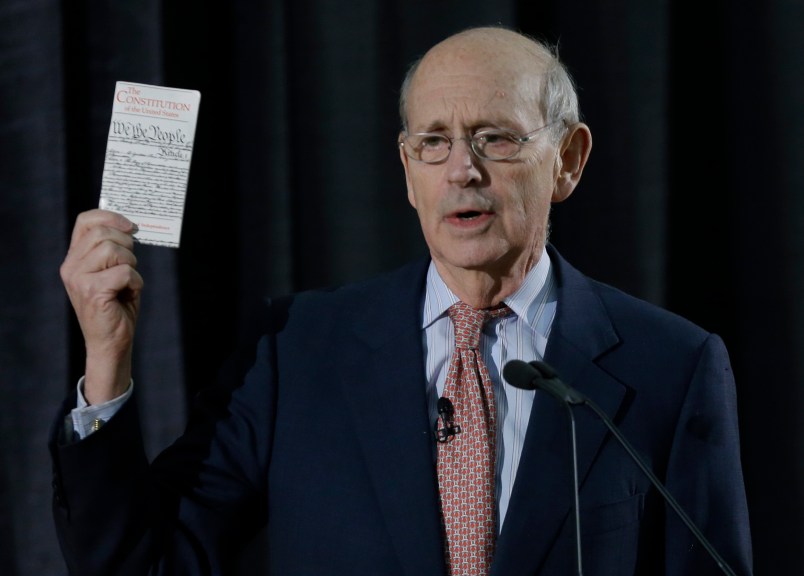Conservative Supreme Court justices handed down another landmark 5-4 ruling Wednesday to wipe out overall campaign contribution limits by an individual to candidates and political committees, bringing the ire of the liberal wing.
“Where enough money calls the tune, the general public will not be heard,” Justice Stephen Breyer wrote, in a dissenting opinion signed by Justices Ruth Bader Ginsburg, Sonia Sotomayor and Elena Kagan.
The blistering dissent went after the controlling opinion by Chief Justice John Roberts as “wrong,” “faulty” and premised on a misreading of the facts and constitutional importance of the laws.
“Taken together with Citizens United v. [FEC], today’s decision eviscerates our Nation’s campaign finance laws,” Breyer wrote, warning that it would elevate “grave problems of democratic legitimacy” that contribution limits were designed to resolve.
Drawing upon prior Supreme Court rulings that upheld campaign finance restrictions, he sought to debunk Roberts’ arguments piece by piece, starting with his contention that unlimited campaign contribution does not give rise to “quid pro quo corruption.” Breyer argued that Roberts’ definition of such corruption is overly “narrow” and limited to direct bribery for a specific act.
“In making this argument, the plurality relies heavily upon a narrow definition of ‘corruption’ that excludes efforts to obtain ”’influence over or access to’ elected officials or political parties,'” he wrote, adding: “Speech does not exist in a vacuum. Rather, political communication seeks to secure government action.”
It was a response to Roberts’ argument that: “Spending large sums of money in connection with elections, but not in connection with an effort to control the exercise of an officeholder’s official duties, does not give rise to such quid pro quo corruption.” The chief justice argued that “[t]here is no right more basic in our democracy than the right to participate in electing our political leaders.”
The case, McCutcheon v. FEC, was brought by Shaun McCutcheon, an Alabama-based engineer and Republican political activist. It was argued in October. Roberts’ opinion was joined by Justices Antonin Scalia, Anthony Kennedy and Samuel Alito. Justice Clarence Thomas agreed with the ruling but wrote a concurring opinion arguing for wiping out additional campaign finance laws.
Breyer, a Clinton-appointed justice, knocked the conservative justices’ contention that aggregate contribution limits don’t serve an important purpose, arguing that a person can, in their absence, “channel millions of dollars to parties and to individual candidates, producing precisely the kind of ‘corruption’ or ‘appearance of corruption’ that previously led the Court to hold aggregate limits constitutional.” He provided a table that detailed how one person could funnel up to $3.6 million to one politician without aggregate donation limits.
Breyer’s conclusion? The Supreme Court’s ruling “fails to recognize the difference between influence resting upon public opinion and influence bought by money alone.” It “creates huge loopholes in the law,” he added, which “undermines, perhaps devastates, what remains of campaign finance reform.”






